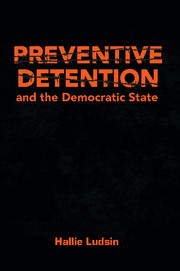Book contents
- Frontmatter
- Contents
- Acknowledgements
- List of Acronyms and Abbreviations
- Introduction
- 1 The Theoretical Framework
- 2 The Policy Debates
- 3 Preventive Detention under International Law
- 4 The History of Preventive Detention in India
- 5 India's Current Preventive Detention Legislation
- 6 India: Preventive Detention and Due Process
- 7 India: The Risk Society and the Slippery Slope
- 8 Preventive Detention in England
- 9 England: Preventive Detention and Due Process
- 10 Preventive Detention in the United States
- 11 The United States: Preventive Detention and Procedural Due Process
- 12 Preventive Detention's Slippery Slope
- 13 Preventive Detention and Liberal Democracy
- Index
11 - The United States: Preventive Detention and Procedural Due Process
Published online by Cambridge University Press: 05 March 2016
- Frontmatter
- Contents
- Acknowledgements
- List of Acronyms and Abbreviations
- Introduction
- 1 The Theoretical Framework
- 2 The Policy Debates
- 3 Preventive Detention under International Law
- 4 The History of Preventive Detention in India
- 5 India's Current Preventive Detention Legislation
- 6 India: Preventive Detention and Due Process
- 7 India: The Risk Society and the Slippery Slope
- 8 Preventive Detention in England
- 9 England: Preventive Detention and Due Process
- 10 Preventive Detention in the United States
- 11 The United States: Preventive Detention and Procedural Due Process
- 12 Preventive Detention's Slippery Slope
- 13 Preventive Detention and Liberal Democracy
- Index
Summary
Having already identified sex offenders and suspected terrorists as deviant others deserving of preventive detention, this chapter focuses on the policy issues that erupt in practice from carrying out detention. In the US, most of the answers to the policy questions focus on complying with the Constitution's due process requirements. Chapter 7 examined substantive due process issues – it asked whether preventive detention is ever fair, assuming the best of procedures. Chapter 8 looks at procedural due process issues – having decided it could be fair, what is the minimum process the Constitution requires. The answer depends on the Supreme Court's interpretation of the Fifth and Fourteenth Amendments. The Supreme Court has deferred judgment on adequate process for suspected terrorists to the US Circuit courts, which under the Detainee Treatment Act means the US District and Circuit Courts for the District of Columbia, or the DC District courts.
Detention jurisdiction
The first set of issues this chapter tackles are jurisdictional: how the government chooses who to detain, who is responsible for making that choice and which type of law applies to the detention regime. The first issue describes what behaviour and activities the government considers dangerous, whereas the latter two determine the level of due process owed to the detainee.
Who may be detained
This section details the criteria for detention under each law. Implicit in these criteria are the requirements of necessity and proportionality. They are met prior to passing the legislation, when the government describes a particularly serious harm that the criminal justice system cannot adequately prevent without invoking a state of exception. The decision over necessity and proportionality, to a large degree, is made at the group, rather than individual, level at the time the government employs its cost-benefit analysis.
Suspected terrorists
Combatants: The National Defense Authorization Act (NDAA) allows for detention of an enemy combatant who is defined as someone who (1) “planned, authorized, committed, or aided” the 9/11 attacks or “harbored those responsible” or (2) “who was part of or substantially supported Al-Qaeda, the Taliban, or associated forces … including any person who has committed a belligerent act or has directly supported such hostilities.” To qualify as an associated force, the group must have “an actual relationship” with Al-Qaeda or the Taliban, rather than simply a shared goal.
- Type
- Chapter
- Information
- Preventive Detention and the Democratic State , pp. 341 - 387Publisher: Cambridge University PressPrint publication year: 2016



